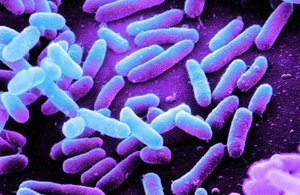PHE investigating national outbreak of E. coli
Public Health England (PHE) is leading the investigation of an outbreak of illness caused by the E.coli bacteria.

Ecoli
So far 75 people have been affected (primary cases): 67 in England, 3 in Wales and 5 in Scotland. Genetic analysis has shown that all these individuals have all been infected with the same E.coli strain. Most of these cases are adults but the total number of cases has an age range of between 2 to 90. Twenty-seven males and 48 (64%) females have been affected.
In addition, there have also been 10 secondary cases reported. These are people who have become unwell through contact with a primary case.
Further details are available on 82 of the total cases all of whom reported symptoms of diarrhoea. Bloody diarrhoea was reported by 58 people (71%) and 25 people have been hospitalised as a result of their illness. There have been no deaths or cases of haemolytic-uraemic syndrome which is a serious complication of an E. coli infection which can result in kidney failure.
PHE is working with Public Health Wales, Health Protection Scotland, Animal and Plant Health Agency and the Food Standards Agency to gather, share and analyse information. At present there is no clear indication as to what is causing the outbreak.
Dr Bob Adak, head of the gastrointestinal diseases department at PHE, said:
Any infection with E. coli can be very serious. We have carried out initial investigations which involved interviewing some of the affected people to look for connections that link individuals in terms of the foods that they had eaten and the places they had visited in the days before they became ill. This information is now being used to develop more in-depth investigations designed to identify the cause of the outbreak.
Avoid E. coli infection through food and general hygiene:
- washing the hands thoroughly using soap or disinfectant after using the toilet and then dry them thoroughly
- wash hands before and after handling food
- remove any loose soil before storing vegetables and salads to avoid cross contamination of clean items
- thoroughly wash all vegetables (including salads) that will be eaten raw unless they have been pre-prepared and are specifically labelled ‘ready to eat’
- do not prepare raw vegetables with utensils that have also been used for raw meat
- keep raw meat and unwashed vegetables away from ready-to-eat foods during storage and preparation
- use different chopping boards, knives and utensils for raw and ready-to-eat foods, or ensure they are washed thoroughly between uses
- wash your hands thoroughly after handling raw food, including meat and unwashed vegetables. Always wash your hands thoroughly before preparing food, particularly after using the toilet (or helping others including changing nappies), before meals, and after contact with animals or their environments
- cook all minced meat products (like burgers, meatloaf, meat balls) thoroughly, until steaming hot throughout and no pinkness or red meat is visible when you cut into them
- ensure that refrigerators are working correctly: bacteria grow more quickly at temperatures above 4°C
- only leave cooked foods, meat and dairy products out at room temperature for a short time
- store uncooked meats below cooked meats, salad, fruit or vegetables that might be eaten raw to avoid dripping meat juices onto ready to eat food
- store uncooked and cooked meats on different plates. Avoid all contact between raw and cooked meats
- people who have been ill should not prepare food for others for at least 48 hours after they have recovered
- supervise handwashing in young children, especially after handling animals or their surroundings, for instance on a visit to a farm
- individuals working with uncooked meats or on farms should pay close attention to good hygiene practices, as should visitors to farms